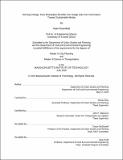Driving change : how workplace benefits can nudge solo car commuters toward sustainable modes
Author(s)
Rosenfield, Adam (Adam Isaac)
DownloadFull printable version (33.99Mb)
Alternative title
How workplace benefits can nudge solo car commuters toward sustainable modes
Other Contributors
Massachusetts Institute of Technology. Department of Civil and Environmental Engineering.
Advisor
Jinhua Zhao and John P. Attanucci.
Terms of use
Metadata
Show full item recordAbstract
This thesis investigates the role that employer benefits can play in encouraging commuters to use sustainable modes of transportation, motivated by the increasing cost of parking provision at urban workplaces and the broader potential for travel demand management strategies to mitigate traffic congestion and pollution. In this research, case studies are conducted at two urban employers in Greater Boston. At the Massachusetts Institute of Technology (MIT) and at Partners HealthCare, employee transportation benefits were recently enhanced to encourage alternatives to driving. MIT, concerned about an upcoming reduction in parking supply, announced in 2016 that it would provide its more than ten thousand staff with a fully-subsidized local transit pass. In an agreement with the transit agency, MIT only pays for transit trips taken, thereby avoiding the expense of monthly passes for non-riders while providing universality of coverage. For drivers, MIT eliminated annual parking permits in favor of daily, pay-as-you-park pricing to encourage multi-modality. The net result was an eight percent reduction in parking demand in the first year, at a net cost to MIT of about $200 per employee. Transit agency revenue increased as ridership among MIT employees rose approximately ten percent. Partners HealthCare was motivated to reduce its employee parking demand in the midst of consolidating fourteen administrative worksites to a new facility in Somerville, MA, and faced cityƯimposed parking restrictions. Like MIT, it introduced daily parking pricing, but tied the rates to employee income as an equity measure. Unlike MIT, it did not offer a universal transit pass, but increased monthly pass subsidies. With the new facility located along the MBTA Orange Line, there was a marked increase in transit ridership among employees who used to work in the suburbs, and today parking demand is well below anticipated levels. The thesis supplements these case studies with a randomized controlled experiment on two thouƯsand MIT car commuters, investigating how behavioral 'nudges' can further encourage reductions in driving. While no statistically significant reductions in parking were observed during the experiment, the combination of token monetary rewards and informational nudges appeared most effective at shifting travel behavior. This research illustrates the potential for travel demand management strategies to influence commuter mode choice, but reinforces the importance of carefully considering implementation deƯtails such as cost salience and user experience. Long-term success appears dependent on building a constituency of support for such strategies among employer, commuter and government stakeholders.
Description
Thesis: M.C.P., Massachusetts Institute of Technology, Department of Urban Studies and Planning, 2018. Thesis: S.M. in Transportation, Massachusetts Institute of Technology, Department of Civil and Environmental Engineering, 2018. This electronic version was submitted by the student author. The certified thesis is available in the Institute Archives and Special Collections. Cataloged student-submitted from PDF version of thesis. Includes bibliographical references (pages 223-229).
Date issued
2018Department
Massachusetts Institute of Technology. Department of Civil and Environmental Engineering; Massachusetts Institute of Technology. Department of Urban Studies and PlanningPublisher
Massachusetts Institute of Technology
Keywords
Urban Studies and Planning., Civil and Environmental Engineering.